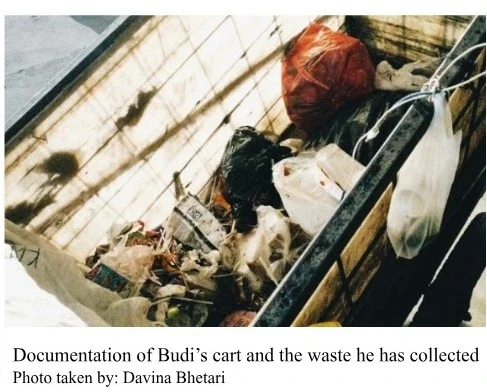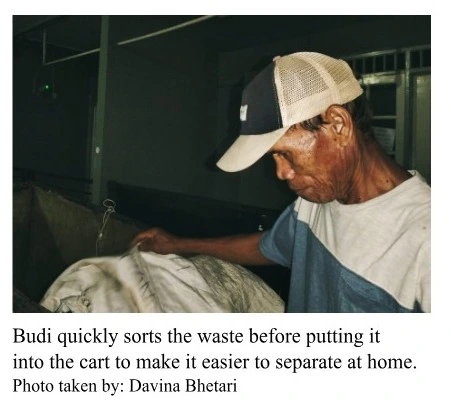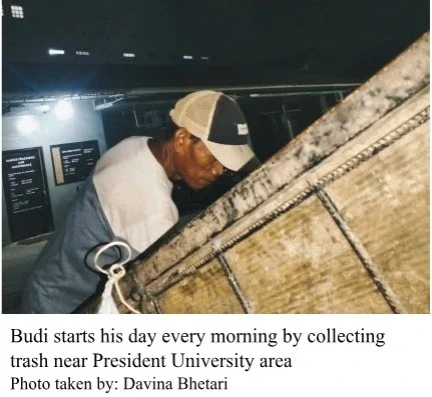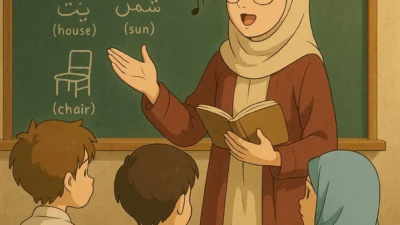“Will this ever be enough? Will we ever have more than just enough to survive?” Budi, a scavenger, voiced his quiet question to the world, yet he found strength in the simplest things, saying, “Even one meal is a blessing. As long as I can keep going, I’ll be thankful.”
Budi took a deep breath, sitting at the small table in his cramped one-room home. Not a single bite of food was in sight—completely empty. Just like yesterday, there was nothing to eat again today. Perhaps tomorrow, or the day after, would be no different. He and his wife would have to return to scavenging through trash, hoping to earn enough for a single meal. Even being able to eat once a day felt like a blessing they could barely afford. He looked up, his heart heavy with despair. Could God truly be this unfair?
Before the sun had a chance to rise and chase away the night, Budi, said goodbye to his wife with a smile that hid his worries. With an old cart and a worn-out hat that had been with him through many dawns, he stepped out, ready to face the new challenges waiting for him in Jababeka, North Cikarang, Bekasi Regency.
The Scavenger’s Morning
In the early hours, before the city’s usual chaos began, Jababeka seemed almost serene. Its wide streets and towering industrial buildings stood silent, as if offering a momentary peace to those who struggled the hardest. This fleeting stillness was Budi’s favorite time of day. With each step, the wheels of his cart creaked loudly, breaking the silence as he made his way to the familiar dumpsters and alleyways that had become his workplace.
“Finding trash here isn’t too hard,” Budi explained, his voice calm yet tinged with exhaustion. “But sorting it—that takes time. Plastic, cardboard, metal—everything needs to be separated before it can be sold.”
As he rummaged through a large pile of waste near a bustling industrial complex, Budi’s hands worked swiftly. Years of experience had taught him to distinguish between recyclable materials at a glance. A stack of cardboard boxes, a handful of plastic bottles, and a stray aluminum can all found their way into his cart.
Each item was a step closer to survival—not a fortune, but perhaps enough to buy a small meal for himself and his wife.
An Honest Living Amidst Challenges

Budi’s day often began at 4 a.m., just as the city’s industrial workers were waking up. By noon, he’d already spent hours collecting and sorting waste, his cart heavy with the fruits of his labor.
“My job is dirty; I know that. But without it, I wouldn’t survive,” Budi said, pausing to wipe sweat from his brow. His earnings ranged from Rp 25,000 to Rp 75,000 a day, depending on how much recyclable material he could collect. “If I’m lucky, I can earn enough to buy food for both of us. If not, I wait. My wife eats first; I’ll eat later when I can.”
Despite the meager income, Budi took pride in his work. “Better to earn a little honestly than to take what isn’t mine,” he added, his eyes glinting with quiet determination.
However, his work wasn’t without its hardships. From harsh weather to social stigma, Budi faced challenges that would break the spirit of many. “I’m used to being looked down on. People throw trash at me—sometimes literally. It’s just part of the job,” he said with a shrug, masking the pain such treatment caused.
Baca Juga: The Dangers of Drugs for Youthers
The Reality of Waste Management in Jababeka
Budi is one of many scavengers in Jababeka, an industrial hub in Cikarang known for its factories and warehouses. The area generates mountains of waste every day, much of which is recycled thanks to scavengers like Budi. They play an unseen yet crucial role in managing the city’s garbage, sorting and selling materials that would otherwise end up in landfills.
Scavengers around Jababeka often sell their collected waste to PT Jababeka, particularly through initiatives like the establishment of waste banks. These waste banks, such as Bank Sampah Mekarwangi, are supported by PT Jababeka as part of their corporate social responsibility efforts. Here, scavengers like Budi can deposit recyclables like plastics, cardboard, and metals, which are weighed and valued, providing their main source of income.
Recyclable items fetch varying prices in Jababeka. Plastic bottles might earn Rp 700 to Rp 2,500 per kilogram, while aluminum cans can go for as much as Rp 12,000 per kilogram. Clean and sorted materials fetch higher prices, which is why Budi meticulously separates his findings before selling them to local recycling centers.
But even in this ecosystem, Budi’s life is fraught with uncertainty. “The price of waste changes a lot,” he explained. “Sometimes I think, will this ever be enough? Will we ever have more than just enough to survive?”
A Glimpse of Hope

As the day progressed, the streets of Jababeka grew louder. Trucks roared past, workers filled the sidewalks, and the air became heavy with the sounds of industry. Budi’s cart was nearly full, but his mind was far from at ease. Each day brought the same routine, the same struggles. Yet, deep within, he clung to a fragile hope—a hope that one day, things might change.
“What I really want is for people to treat us like humans,” he said, his voice firm. “We work hard. We don’t ask for pity, just a little respect.”
Despite everything, Budi remained grateful for the little he had. “Even one meal is a blessing,” he said. “As long as I can keep going, I’ll be thankful.”
Baca Juga: The Impact of Technology on Mental Health in the Digital Age
Evening Reflections
By the time the sun began to set, Budi had returned home. His wife greeted him with a tired smile, and together they sorted through the day’s collection. It was a slow and laborious process, but it was their reality.
As they worked, Budi reflected on his life. The days were long, the work was hard, and the rewards were few. But in the quiet moments, as he sat beside his wife in their little home, he allowed himself to dream. Perhaps tomorrow would bring something different. Perhaps someday, the world would see scavengers not as a nuisance, but as people with dignity and worth.
A Voice for Change
Budi’s story is one of resilience, humility, and unshakable hope. His life is a reminder of the hidden struggles faced by those who work tirelessly to survive. Beneath the dirt and grime of his work lies a heart filled with dreams, love for his family, and an unwavering belief in the value of hard-earned honesty.
“My work may be dirty, but my money is clean,” he said with quiet pride. “People think of us as nothing more than scavengers, but we’re human too. We laugh, we cry, and we have dreams, just like anyone else. All I wish is for people to see us for who we are, not what we do. We don’t need pity; we need kindness. Treating each other with humanity—that’s what makes the world better.”
This news feature is based on a direct interview with Budi and information from the website Jababeka.
Writer: Davina Bhetari Adinda
Mahasiswa Ilmu Komunikasi President University
Editor: Ika Ayuni Lestari
Senior Editor: Rahmat Al Kafi
Ikuti berita terbaru di Google News













